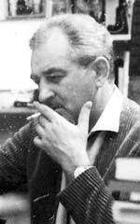
Jens Rehn grew up in Berlin, the son of the chamber virtuoso Paul Luther. After attending high school and conservatory, he began a career as an officer in the Navy in 1937. During World War II he was commander of the submarine U-135 from June 4, 1943 to July 15, 1943. In 1943 he was imprisoned for four years, which he spent in Africa, Canada and England.
From 1947 to 1949 he was a freelancer, from 1950 to 1981 editor of the literature department of the RIAS in Berlin. From 1954 to 1958 he studied philosophy, English and musicology at the Freie Universität Berlin. In addition to his work as an editor, Rehn composed, wrote a number of radio plays and undertook extensive trips to East Asia, India and the USA.
His novel Nothing in Sight, in which he processed his war experiences through the story of two shipwrecked people, an American pilot and a German U-boat soldier, received a lot of attention and was described by Marcel Reich-Ranicki as a "parable of great clarity and suggestiveness". ; the critic wrote: "We shouldn't, we mustn't, forget the book Nothing in sight: It is both in one – a contemporary historical and an artistic document."[1]" Nothing in sight also received great praise from Gottfried Benn.[2] In 1959, Jens Rehn addressed the topics of nuclear war and death by radiation in the expressionist science fiction novel Die Kinder des Saturn.




